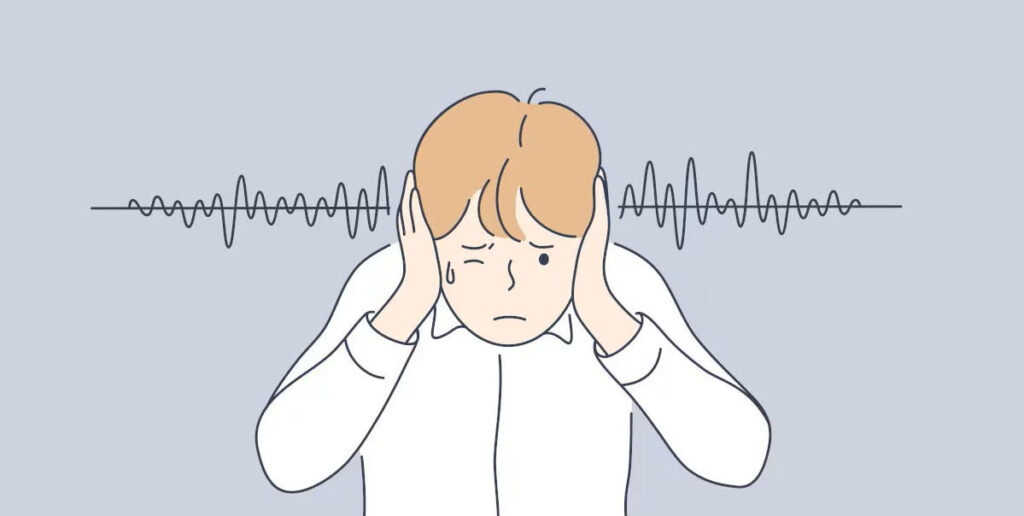What is Tinnitus or Tinnitus?
It is a sound that we perceive when in reality there is no external factor that produces it, so we only hear it ourselves. Some people usually perceive it as a high-pitched whistling sound, although there are also people who perceive it as the snow noise of an old television, as a low-pitched buzzing sound or it can even vary depending on the time of the day. There are two types of tinnitus:
-
Objective tinnitus: these are the rarest and, for example, are caused by the blood system passing through the middle ear, which is usually perceived as a murmur that accompanies the rhythm of the heart. Others are crackling noises, caused by the rubbing of the middle ear structures in cases of otosclerosis and cholesteatomas, etc.
-
Subjective tinnitus: these are the most common and in most cases are perceived as a high-pitched whistling sound, although it can also be a low humming sound, the sound of snow from a TV, etc. This Tinnitus usually corresponds to a sound frequency that usually coincides with the frequency area affected by the hearing loss. As the most common hearing loss tends to be in high frequencies, the most common Tinnitus is the one perceived as a high-pitched whistling sound. To a lesser extent, it can also be perceived as a severe buzzing sound and usually occurs in people with sensorineural hearing loss in severe frequencies, for example, in some cases of Meniere’s disease.
What causes Tinnitus?
Although the origin of subjective tinnitus is still unknown, we can affirm that it is caused by an affection in the auditory pathway that goes from our ear to our brain.
And that it is not really a disease, but a symptom of another pathology. This pathology is usually hearing loss or also called hypoacusis. That is, when we suffer from hearing loss, one of the symptoms is Tinnitus.
It is common in hearing loss caused by:
– Having been exposed to loud sounds.
– Having undergone treatment with ototoxic drugs.
– Acoustic nerve neurinoma.
– Presbycusis: age-related hearing impairment.
– Etc.
Why don’t I notice that I have hearing loss, but I have tinnitus?
The spectrum of sound heard by humans ranges from 20 Hz. Up to 20,000 Hz. But to communicate and speak, our phonatory system only uses the frequency range that goes from 250 Hz. Up to 8,000 Hz.

These are the most common cases in which we do not associate our Tinnitus with hearing loss:
When hearing loss affects frequencies between 8,000 Hz and 20,000 Hz, we hardly notice it. And we do not perceive this loss because we can continue to communicate, speak and hear others without difficulty. But our brain does notice it, and manifests it with Tinnitus. This Tinnitus located in high frequency is common in young or middle-aged people who go for a typical audiometry (from 125 Hz. to 8,000 Hz.) with normal results, but they still say that they perceive a Tinnitus. At Aude Centro Auditivo we can perform High Frequency Audiometry to locate these “hidden hearing losses”.
In the case of people exposed to loud sounds, hearing loss usually manifests itself with a drop in hearing in the 3,000 Hz and 4,000 Hz frequencies, but the rest of the frequencies are heard well. These people, depending on the degree of hearing loss, state that they hear but do not understand, and this is accentuated when there are several people talking or when there is ambient noise. This is due to the fact that they perceive most speech sounds and phonemes well, but the sounds that specifically coincide with their hearing loss are perceived with difficulty. In these people are common comments such as: “I hear you, but I do not understand you”, “speak better because I do not know what you are saying”, etc. In these cases the Tinnitus is also usually acute and can be located in High Frequency or in those around their hearing loss.
In presbycusis or hearing loss due to age, there is a sweeping of the high frequencies towards the low frequencies. At the beginning it goes unnoticed since it affects the frequencies of 8,000 Hz. and 6,000 Hz. which slightly affect comprehension, but when the sweep reaches 4,000 Hz. it does affect the comprehension of the word, the comments of the previous case are repeated where the person hears, but does not understand. Not all cases of Presbycusis perceive a Tinnitus and the cases in which they do perceive it is usually of progressive appearance and in some cases it can even disappear with the passing of the years.
Is there a solution for Tinnitus and what can I do?
In most cases to treat subjective tinnitus we have to treat the hearing loss. There are specific cases, for example, the pathology of Meniere where there is a fluctuating hearing loss and Tinnitus, that with the medical treatment prescribed by the ENT, we get an improvement of hearing and Tinnitus. In other cases, for example, pathologies of vascular origin are treated with vasodilators. But in the vast majority of cases where the hearing loss is irreversible, the best treatment is the stimulation of the auditory pathway, and this is achieved with the use of hearing aids, as simple as that.
Most of the people affected by subjective tinnitus who start using hearing aids show a significant improvement in the perception of this, even disappearing while wearing the hearing aids, and this is achieved by stimulating the auditory pathway in the frequencies that were affected by the hearing loss through the hearing aids.
Tinnitus, a serious problem
Tinnitus can even prevent a normal life because it causes stress, it is always present, it does not allow us to concentrate, sleep, etc. In these cases it is necessary to resort to auditory therapies. We have the classic TRT therapy of habituation and in Aude Hearing Center we are performing the new Notch Therapy that is giving very good results in Tinnitus located below 8,000 Hz.
If you have a sudden Tinnitus that lasts a few seconds, it is normal. But if it persists over time, you should urgently undergo a hearing test and make an appointment with your medical specialist to assess the cause.
Do you suffer from tinnitus and are looking for a solution? At Aude Centro Auditivo Málaga, we are here to help you. Contact us at and schedule a no obligation hearing evaluation.


